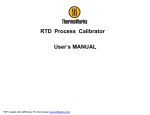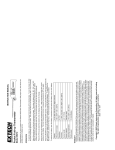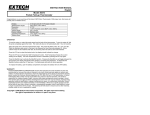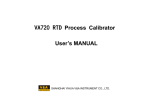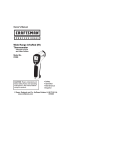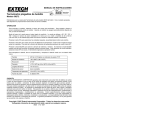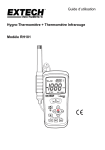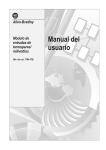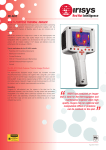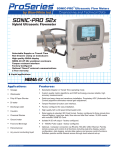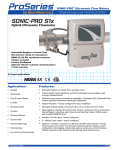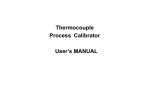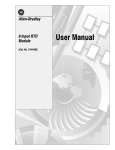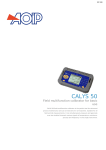Download Manual
Transcript
HANDHELD DIGITAL CLAMP MULTIMETER AX-C850 OPERATOR’S INSTRUCTION MANUAL Safety Information To avoid possible electric shock or personal injury: • Never apply more than 30V between any two jacks, or between any jack and earth ground. • Make sure the battery door is closed and latched before you operate the calibrator. • Remove test leads from the calibrator before you open the battery door. • Do not operate calibrator if it is damaged. • Do not operate the calibrator around explosive gas, vapor, or dust. To avoid possible damage the calibrator: • Make sure choose the right jack and rang, before use the calibrator to measurement or calibrator. • Take away the calibrator from the used circumstance, before operate the calibrator or after close the calibrator. Introduction RTD Process Calibrator is exactitude measurement and source instrument, it can be use to calibrate the RTD* transmitter (include most impulse transmitter). RTD Process Calibrator can measure or simulate 7 difference types of RTD ( o C or o F) and measure or simulate the Resistance. But it could not use to measurement or source at a same time. The accessories: 2 pair of test lead and alligator clip, 6 *AAA 1.5V battery, user’s manual. If the Calibrator is broken or short of some accessories, please contact the supplier. The following table has showed the technical parameter and function of the Calibrator. Specification All the specification will under 1 year calibration cycle and temperature between 18~28oC, except addition explain. Measure (input)/Simulate (output) Resistance specification. Range Measure accuracy Simulate accuracy Admie excitation 4W ± Ω ±Ω mA 0,15 0,1 ~ 0,5 0,00 Ω ~400,00 Ω 0,1 0,1 0,5 ~ 3,0 400,0 Ω ~ 1500,0 Ω 0,5 0,5 0,05 ~ 0,8 1 0,05 ~ 0,4 1 1500,0 Ω ~ 3200,0 Ω * 2 RTD Resistance Temperature Detector 2 Admit excitation current only apply on simulate mode. The admit excitation current could be marked on the OHM meter or RTD meter which was connected to the calibrator. Admit excitation current: 0.2mA Max input voltage: 30V Measure (input)/Simulate (output)RTD specification Mode Accuracy oC Range Input 4W Input 2W/3W Admie excitation Output mA Pt10 385 -200~800oC / 328~1472oF Pt50 385 -200~800oC / 328~1472oF 0,7 1,0 0,7 0,1~3,0 Pt100 385 -200~800oC / 328~1472oF 0,33 0,5 0,33 0,1~3,0 Pt200 385 -200~250oC / 328~482oF 0,2 0,3 0,2 0,1~3,0 250~630oC / 482~1166oF 0,8 1,6 0,8 -200~500oC / 328~932oF 0,3 0,6 0,3 500~630oC / 932~1166oF 0,4 0,9 0,4 -200~100oC / 328~212oF 0,2 0,4 0,2 100~630oC / 212~1166oF 0,2 0,5 0,2 -200~630oC / 328~1166oF 0,3 0,5 0,3 Pt500 Pt1000 Pt100 385 385 JIS Nie określana 0,1~3,0 0,05~0,8 0,05~0,8 0,1~3,0 Admit excitation current only apply on simulate mode. The admit excitation current be marked on the OHM meter or RTD meter which was connected to the calibrator. Admit excitation: 0.2mA Max input voltage: 30V 3 General Specifications: Maximum voltage applied between any jack and earth ground or between any tow jack: 30V RTD 0.1 oC/oF Resolution: o Resistance: 0.01/0.1 Ω o Storage temperature: -40 C~60 C Operating temperature: -10 oC~55 oC Operating altitude: 3000 meters maximum Temperature coefficient: ±0.01%/oC on 0oC~18oC and 28oC~50oC Relative humidity: 95% up to 30oC, 75% up to 40oC, 45% up to 50oC, 35% up to 55oC Shock: Random 2g, 5Hz to 500Hz Safety: 1 meter drop test Power requirements: 6xAAA 1.5V Battery Size: 205mmx98mmx46mm Weight: 472 g (include battery) International Symbols Symbol Meaning Earth ground Conform to European Union directives Refer to his instruction sheet for information about this feature Battery Double insulation Explanation on Front Panel The front panel is show as in right figure: 1. 4wire input jack (NC on output) 2. 2wire input/output jack 3. 2wire input/output jack 4. 3wire input jack (NC on output) 5. Power key 4 6. RTD mode key 7. oC/oF key 8. Input/Output key 9. Increase more value key/wire mode select 10. Reduce more value key/wire mode select 11. Increase less value key 12. Reduce less value key 13. Low power indication 14. Output state indication 15. Output state indication 16. Reading value 17. Unit indication 18. Mode indication Operation Instructions RTD measurement 1 Press the power key 5 , turn on the calibrator. 2 Press the Input/Output key 8 , when on the input mode. 3 Press RTD mode key 6 , on the measure type you want. 4 Put the RTD or Resistance on the input jack. 5 If you want to measure with 3W/4W mode, press the wire mode select key 9 , 10 to select, and put the wire to the correspond input Jack. 6 Get the reading value 16 *The number in the , referring to the „Explanation on Front Panel” (Page 4) 5 RTD Simulate 1 Press the power key 5 , turn on the calibrator 2 Press the input/output key 8 , when on the output mode. 3 Press the RTD mode key 6 , on the measure type you want. 4 Press the adjust value key 9 , 10 , 11 , 12 , to let the value on your need. 5 Put the RTD meter or Resistance meter on the input Jack. 6 If you want to output with 3W/4W mode, put the other wire on the 2wir jack like the left picture. 7 If you want to change the output value, then press the adjust value key 9 , 10 , 11 or change to other RTD type use the RTD mode key 6 . , 12 , *The number in the , referring to the „Explanation on Front Panel” (Page 4) 6 Maintenance Cleaning Periodically wipe the case with a damp cloth and detergent; do not use abrasives or solvents. Calibration Calibrate your calibrator once a year to ensure that it performs according to its specifications. Replacing the Battery Please change the battery when the LCD indicates . Turn off the power of the Calibrator, when you change the battery, and screw off the breechblock on the battery cabinet cover, then take off it and instead the fresh AAA 1.5.V battery. 7







